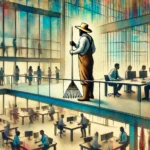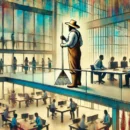We must rethink security from scratch
“The last thing we need right now is a vision.” That was said by a CEO in 1993 – surprisingly, since most business leaders are known to have a penchant for lofty vision and mission statements. The CEO’s name was Lou Gerstner, and he had just taken the reins at the ailing computer giant, IBM.
What he meant was this: when short-term problems are of overwhelming importance, dreams should be far from your mind. What you should be focusing on is the here-and-now. In 1993, IBM had made a loss of US$ 8.1 billion – much more than Kenya’s entire GDP for that year. In those circumstances, the only thing on Gerstner’s mind was an immediate turnaround. He had to stop the bleeding and reinvent his business – fast. The luxury of dreaming about the future would come later.
I am reminded of this when I view the catastrophe that is called ‘insecurity’ in this country. A peculiarly Kenyan word, that: it evokes a mild disquiet, when what is actually happening is that ordinary people are routinely being sprayed with bullets in their cars and homes by seemingly crazed gangsters.
That is no exaggeration. The carnage has reached crisis point. Innocent lives are being taken on a daily basis. No one feels safe: from government bigwigs and diplomats to ordinary estate-dwellers. The killers act with impunity, as though they know something we don’t. As Rome burns, the fiddlers tell us this is ‘normal crime’. That we are all guilty of panic and exaggeration; that those nice mobsters are just doing their routine thing. Nothing to worry about. Really.
Since no more than a handful of people pay any attention to official statements any more, the rest of us can safely conclude: we’re in deep, deep trouble. And we won’t find a way out until we completely rethink our approach to security in this country.
There are three things that are badly wrong. First, our security apparatus remains deeply politicised. The police force and associated agencies remain tools of those in charge, as they have been since colonial days. Far from being allowed to function independently to provide law and order in the land, they are used to consolidate power, undermine opposition and further personal agendas. Look no further than the raid on the Standard Group last year, or the ease with which the ‘Artur’ mercenaries ran amok using official facilities. That was the lowest point we have reached for many a year.
Second, we have neglected our security organs for the past two decades to the extent that many elements in it are indistinguishable from the gun-toting thugs they are supposed to be fighting. A clear example of this was provided last week, when suspects thought to be involved in recent killings managed to escape from a secure police station with some ease. Conversations with ordinary citizens will confirm that they are loath to report crime or ask for protection from the police – for fear that their real troubles will actually begin then.
A third fundamental problem: we have allowed the management of the security forces to stagnate to the extent that it is hopelessly out of date. Modern management techniques have come on in leaps and bounds throughout the economy – but not in this most crucial of arenas. In fact security structures, processes and attitudes remain pretty much those we inherited from the colonial government – anachronisms in a world that moved on long ago.
Do our protectors use modern human-resource management techniques to recruit, motivate and reward their people? Do they seek, and gain, the best talent in the market, or do they just gather up society’s dropouts? Do they maintain professional intelligence systems that utilise the best technology? Do they run efficient processes and take pride in their facilities? Do they investigate, or just eliminate? Are they answerable to those whom they serve, or above reproach?
Wordy missions and lovely visions are generated to fill hefty documents. But, like IBM in 1993, they are the last thing we need. We are in crisis, and we need a turnaround. What we must do is to rethink and rebuild our approach to the provision of security – from the ground up. We can kill all the ‘most-wanted’ hoodlums we want, but we are merely lancing boils when the illness goes much deeper.
There are many excellent officers in the security forces, but they are not given a world in which they can excel. We need security services that are freed from the politicians, that are held to the highest ethical standards, and that utilise the best management techniques in the world. There is no reason at all that we cannot have this. Safety of person is the most basic of rights, and is the first thing any government should deliver. All we need is for our leaders to finally say it should be so, and then allow it to happen. Until then, we are shooting in the dark.

Buy Sunny Bindra's book
UP & AHEAD
here »
Popular Posts
- What is a nation?June 30, 2024
- To be a great leader, think like a farmerJuly 21, 2024
- Don’t be surprised by surprisesJuly 14, 2024
- It takes mavericks to change the gameJuly 7, 2024
- Why we should all be activistsJune 16, 2024











